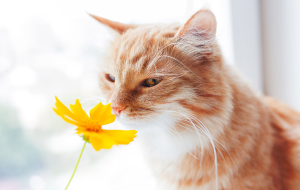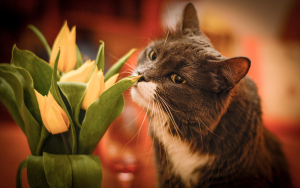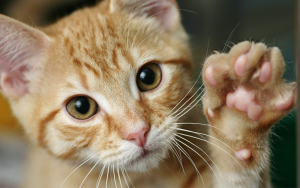Can Cats Eat Peanut Butter? The Truth You Need to Know About Your Feline’s Diet

Introduction:
As pet owners, it’s only natural to want to share our favorite snacks with our furry companions. One such snack that often catches our attention is peanut butter. Its creamy texture and rich taste make it a go-to treat for many humans, but what about
our cats? Can cats eat peanut butter safely, or should it be avoided?
In this comprehensive article, we will explore whether peanut butter is suitable for your feline friend, the potential risks and benefits, and what you should keep in mind when offering treats to your cat. Let’s dive into the details and find out if peanut
butter is a safe indulgence for your cat.
1. Understanding a Cat’s Nutritional Needs
Before we get into whether peanut butter is safe for cats, it’s important to understand the basic nutritional requirements of cats. Cats are obligate carnivores, meaning they thrive on a diet that is primarily made up of animal-based proteins and fats.
Unlike humans, cats have a limited ability to digest plant-based materials, which is why their diet should focus on meat.
The core nutrients a cat needs include:
- Protein: The primary source of energy and growth for a cat.
- Fat: Essential for healthy skin, fur, and brain function.
- Taurine: An amino acid found in animal tissues, necessary for cardiovascular health.
- Vitamins and minerals: Cats need a variety of essential nutrients that are found in meat.
This means that when considering any food or treat for your cat, you must ensure it aligns with their nutritional needs, avoiding foods that could disrupt their digestion or cause harm.
2. What Is Peanut Butter?
Peanut butter is a popular food made from ground peanuts, typically combined with oil, sugar, and sometimes salt. It’s widely consumed by humans for its creamy texture, protein content, and versatility in various dishes.
While peanuts are a good source of protein and healthy fats for humans, they do not offer the same benefits to cats. In fact, most peanut butters on the market today contain ingredients that may not be suitable for cats, such as added sugar, salt, or
preservatives. Additionally, peanut butter can be high in calories and fat, which may not align with your cat’s nutritional needs.
3. Can Cats Eat Peanut Butter?
The short answer is: yes, cats can eat peanut butter in small amounts, but it’s not a recommended treat. Let’s look at the reasons why peanut butter isn’t the ideal food for cats.
1. Peanut Butter is High in Fat
Peanut butter contains high levels of fat, which can be problematic for cats. While cats do need fat in their diet, excessive amounts can lead to obesity, pancreatitis, and other health problems. Cats have very specific fat requirements, and peanut butter’s
high fat content might not align with those needs.
2. Added Sugar and Salt
Most commercially available peanut butter contains added sugar and salt, both of which can be harmful to cats. Excessive sugar can lead to obesity and diabetes in cats, while too much salt can result in salt poisoning. Cats are particularly sensitive
to high sodium levels, and consuming even small amounts of peanut butter with salt can cause digestive upset or more serious health issues.
3. Potential Allergies
Just like some humans, cats can develop food allergies, and peanuts are among the most common allergens for cats. If you introduce peanut butter to your cat’s diet, it’s important to watch for signs of an allergic reaction, such as vomiting, diarrhea,
or skin irritations. If any of these symptoms occur, discontinue giving peanut butter to your cat immediately.
4. Difficulty Digesting Peanuts
Cats have a limited ability to digest plant-based proteins, such as those found in peanuts. While small amounts of peanut butter may not cause major problems, it could lead to digestive discomfort, including gas, bloating, or diarrhea, especially if consumed
in larger quantities.
5. Choking Hazard
Peanut butter is sticky and thick, which can make it difficult for your cat to swallow, leading to choking or an upset stomach. If your cat is determined to chew on peanut butter, you may end up with a mess to clean up, not to mention the risk of suffocation.
4. Health Risks of Feeding Peanut Butter to Cats
While feeding your cat peanut butter in moderation isn’t immediately life-threatening, the potential risks far outweigh the benefits. Some of the health risks of feeding peanut butter to cats include:
1. Obesity
Peanut butter is calorie-dense, and giving your cat too much can contribute to weight gain. Obesity is a common issue in cats, and it can lead to a number of health complications, including diabetes, heart disease, and joint problems.
2. Digestive Issues
Cats have sensitive digestive systems, and a diet heavy in fats or foods that are difficult to digest can result in vomiting, diarrhea, and stomach discomfort. Peanut butter can be challenging for your cat’s digestive system to process, leading to unwanted
digestive issues.
3. Pancreatitis
An excessive intake of fats—especially from non-animal sources like peanut butter—can increase the risk of pancreatitis in cats. Pancreatitis is an inflammation of the pancreas that can cause severe abdominal pain, vomiting, and even life-threatening
complications if left untreated.
4. Toxic Additives
Many peanut butters contain xylitol, a sugar substitute that is highly toxic to pets. Even small amounts of xylitol can cause rapid insulin release, leading to hypoglycemia (low blood sugar), seizures, liver failure, and death. Always check the ingredients
list for xylitol before offering peanut butter to your cat.
5. What to Do if Your Cat Eats Peanut Butter
If your cat accidentally consumes peanut butter, don’t panic. Most of the time, eating a small amount won’t cause any immediate harm, but it’s still important to monitor your cat for any unusual behavior or symptoms.
Here’s what to do if your cat eats peanut butter:
- Monitor for symptoms: Keep an eye on your cat for signs of an upset stomach, vomiting, diarrhea, or lethargy.
- Provide water: Ensure your cat has access to fresh water to help flush out any excess salt or sugar.
- Consult your vet: If your cat consumes a significant amount of peanut butter or shows signs of distress, contact your veterinarian for advice. If your cat ingested peanut butter with xylitol, seek immediate medical attention.
6. Healthier Alternatives to Peanut Butter for Cats
If you’re looking for a treat to give your cat, it’s better to choose options that are safe and healthy for them. Here are some great alternatives to peanut butter that your cat will love:
1. Cooked Chicken or Turkey
Lean, cooked chicken or turkey is a great source of protein and fat for cats. Make sure the meat is free of bones, skin, and seasoning before offering it to your cat.
2. Catnip or Cat Grass
Catnip and cat grass can be a fun, safe treat for your feline friend. Many cats enjoy the effects of catnip, which can promote relaxation and playfulness.
3. Commercial Cat Treats
There are numerous high-quality cat treats available on the market that are specifically formulated for feline dietary needs. Look for treats that are high in protein and low in carbs, with minimal artificial additives.
4. Tuna or Salmon
Cats love the taste of fish, and offering small amounts of cooked tuna or salmon can be a great way to treat them. Just be sure to avoid canned fish with added salt or seasoning.
5. Freeze-Dried Meat
Freeze-dried meat treats, such as chicken, turkey, or liver, provide protein without added fats, sugars, or preservatives. These are ideal for cats with sensitive stomachs or those needing a high-protein diet.
7. Conclusion
In conclusion, while peanut butter is not toxic to cats, it is not an ideal treat for them due to its high fat content, potential allergens, and added sugars or salts. Feeding your cat peanut butter regularly can lead to obesity, digestive issues, or
more serious health problems.
Instead of reaching for the peanut butter jar, opt for healthier, cat-friendly alternatives that align with your cat’s dietary needs. Always prioritize your cat’s health and well-being by consulting your vet if you’re unsure about any treats or foods.
Remember, your cat’s diet should always be rich in protein, with a focus on animal-based nutrients, and supplemented with safe, appropriate treats to enhance their overall health.







